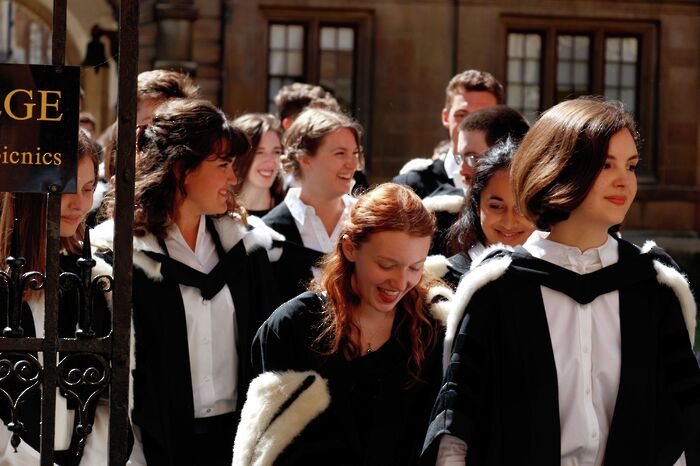Scrap interviews. Randomise Cambridge’s admissions process.
Joe Benton argues that, given the very little evidence in favour of interviews in admissions, it’s time we at least considered radical solutions to this problem.

It is coming around again to that time of year when the anxiety levels of sixth form students across the country peak as the Oxbridge interview season approaches. But this interview process, despite having barely changed for decades, has a problem – there’s scant evidence that it actually works.
Tens of thousands of students are interviewed as part of an Oxbridge application every year, with the interview process dominating the attention of the university for an entire week each autumn. Yet the amount of high-quality data demonstrating that these interviews are an effective way of telling whether a candidate will succeed at university is pitiful. While there is some evidence suggesting that pre- and post-interview written assessments do indeed predict degree performance, the evidential basis for the current interview system is extremely weak. In fact, it amounts to little more than a combination of anecdotes, historical precedence and a gut feeling that interviewers generally ought to be good judges of aptitude and character.
Using a lottery as part of university admissions processes has been suggested before
What we do have a lot of evidence for, however, is the biases that an interview system can introduce. Numerous studies have observed interviewers judging interviewees that they perceive to be similar to themselves more favourably; whether it’s a case of ethnicity, gender, or dialect, when people look or sound like us, it’s very hard not to be more sympathetic. It’s perhaps unsurprising then, given the current make-up of academic staff, that we see the same issues of diversity reflected back in admissions statistics year after year.
And so, we have to ask what our current interview system actually measures. Does it help tease out academic competence over and above any written assessments taken outside of the interview? Or, is the process a skewed, messy compilation of arbitrary and irrelevant signals, such as one’s perceived social status, extrovertedness, or performance on the day? The truth is, we really have no idea.
Randomising admissions would guarantee that the cohort of students who received offers was directly representative of the pool of capable applicants
You might begin to wonder then whether we could save a lot of time and a huge amount of resources by just cutting out the interviews altogether and rolling a dice instead. As absurd an idea as this may sound, using a lottery as part of university admissions processes has been suggested before and even implemented in several countries such as the Netherlands, where until recently applications for degrees such as medicine often included a lottery.
In the case of Oxbridge, such a system would likely consist of a set of minimum application standards, based on a combination of public exam results and subject-specific assessments (in effect, “pre-interview tests” without the interview). This would be followed by colleges or the university selecting applicants randomly - potentially weighted to take into account relative performance on the assessments – from this pool to make offers to.
Once you get over the radical-sounding nature of this suggestion, it is not hard to imagine how replacing interviews with a lottery could have other significant benefits beyond simply saving a lot of time and effort. First and foremost, randomising admissions would guarantee that the cohort of students who receive offers is directly representative of the pool of capable applicants. Compared to an interview system with an almost inherent capacity for personal bias, a lottery, practically by definition, would be completely transparent and treat all applicants equally.
In addition, acknowledging the random component of admissions explicitly would likely lead to students adopting a more balanced and healthy attitude towards applications. Instead of encouraging students to “play the system” and engage in endless interview preparation, a lottery system requiring a set of minimum entry standards would continue to offer students a clear benchmark for academic achievement, while also giving students the freedom to switch off at the end of the day and enjoy other activities, knowing that they had done their best.
Of course, there are several arguments against such a lottery system. Key among them is the perception that it contradicts a principle of justice that places should be attributed in a deterministic way to those who are most suitable, however, whether the current system achieves this is another question. It would also reduce the capacity for human intervention or nuance in the admissions system to take into account exceptional circumstances. Finally, it is of course possible that interviews really are an effective part of the application process and do truly represent applicants accurately.
But until we decide to test these hypotheses properly instead of assuming, we simply don’t know. And even if university interviews turn out to be suitable, effective means of candidate selection, we might still learn a thing or two about what really matters in admissions in the process.
 News / Eight Cambridge researchers awarded €17m in ERC research grants27 December 2025
News / Eight Cambridge researchers awarded €17m in ERC research grants27 December 2025 News / Downing investigates ‘mysterious’ underground burial vault 29 December 2025
News / Downing investigates ‘mysterious’ underground burial vault 29 December 2025 Lifestyle / Ask Auntie Alice29 December 2025
Lifestyle / Ask Auntie Alice29 December 2025 Sport / Hard work, heartbreak and hope: international gymnast Maddie Marshall’s journey 29 December 2025
Sport / Hard work, heartbreak and hope: international gymnast Maddie Marshall’s journey 29 December 2025 Interviews / Meet Juan Michel, Cambridge’s multilingual musician29 December 2025
Interviews / Meet Juan Michel, Cambridge’s multilingual musician29 December 2025









